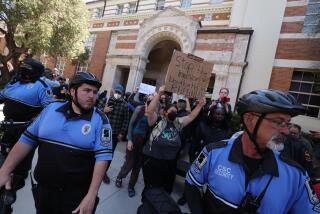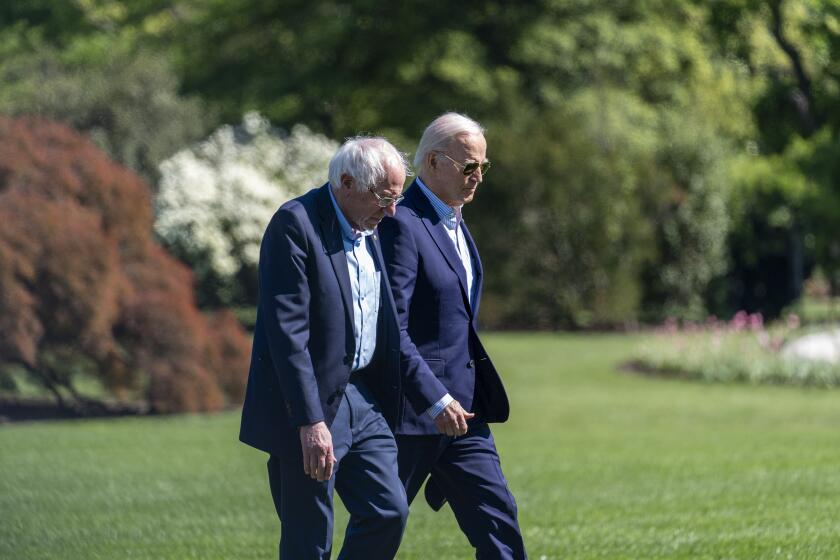Bush Seeks a ‘Quick Resolution’ on Iraq
President Bush on Friday said he wants a “quick resolution” to the confrontation with Iraq, as Secretary of State Colin L. Powell launched a diplomatic offensive to win international support for a showdown with President Saddam Hussein.
In ongoing consultations at the United Nations, Powell is discussing a six-month deadline for finding and dismantling any weapons of mass destruction that Iraq might possess, officials said.
Bush, before a meeting with Central African leaders Friday, said he is “highly doubtful” that Hussein would comply with the long-standing U.N. requirements for inspections to show whether Iraq has eliminated such weapons.
Bush urged the world body to quickly pass a new resolution demanding Iraqi compliance.
“We’re talking days and weeks, not months and years,” Bush said of U.N. action.
The president also expressed scorn for congressional Democrats who want the U.N. to take up the question of dealing with Iraq before the U.S. Congress does.
“I can’t imagine an elected member of the United States Senate or House of Representatives saying: ‘I think I’m going to wait for the United Nations to make a decision,’ ” Bush said.
The president’s tough talk--only a day after he appeared before the U.N. General Assembly and challenged the world body to join the anti-Iraq campaign--underscored his desire to accelerate the pace of a confrontation with Hussein’s regime.
At the same time, his impassioned plea for congressional action on Iraq “as quickly as possible” all but ensures that the issue will play a central role in the congressional election campaigns being waged across the country.
The chief U.N. weapons inspector, meanwhile, warned Friday that it would take four or five months of preparation before inspections could resume in Iraq.
“If they want thorough and complete inspections, it’s not compatible with something hasty,” said Hans Blix, executive chairman of the U.N. Monitoring, Verification and Inspection Commission.
The president on Thursday challenged the U.N. to force Iraq to not only disarm, but also comply with the 15 other Security Council resolutions that Baghdad agreed to in 1991 at the end of the Persian Gulf War.
Bush detailed what he called Iraq’s “decade of deception and defiance,” saying Hussein had reneged on his promises to end political repression and torture, repatriate prisoners of war after the Gulf War and distribute humanitarian goods and medical supplies to his people.
Bush returned to the White House on Friday, but Powell stayed behind. The secretary of State described his lengthy talks with the other 14 members of the Security Council as “very constructive.”
“I think all the members of the council are now seized with the issue [of pushing Iraq to comply with the U.N. resolutions], recognize the challenge that Iraq does present to international law and to the mandate of the Security Council,” Powell said.
“We’re off to a good start,” he added.
The five permanent members who have veto power on the Security Council--the U.S., Russia, China, France and Britain--came to broad agreement on one goal.
“There was complete unanimity on getting the weapons inspectors back into Iraq,” British Foreign Secretary Jack Straw told reporters after the meeting.
Russia, which has the potential to thwart the U.S. push for a tougher stance toward Hussein because of its long-standing alliance and trade deals with Iraq, signed on in principle.
“Iraqi noncompliance with the relevant Security Council resolutions is a serious matter and Iraq must comply,” Foreign Minister Igor S. Ivanov said.
In addition, Prime Ministers Junichiro Koizumi of Japan and Silvio Berlusconi of Italy endorsed international action as the way to exert new pressure on Baghdad. Berlusconi is scheduled to have lunch with Bush today at Camp David in Maryland.
However, in a speech at the U.N., Chinese Foreign Minister Tang Jiaxuan stressed his government’s preference for avoiding force.
“Efforts should be made to prevent the arbitrary enlargement of the scope of a counter-terrorism campaign,” Tang said.
The first day of intense diplomacy following Bush’s U.N. speech focused on principles rather than specifics.
But the Bush administration already faced one possible setback on the formula for U.N. action--particularly on the question of how many resolutions the U.N. should adopt.
Though Washington is “still open” to more than one resolution, a senior State Department official said, behind closed doors the U.S. is pushing for a single resolution that would cite the Iraqi regime for already breaching the world body’s previous resolutions. The new measure would allow Baghdad one final opportunity to destroy any chemical, biological and nuclear weapons it might possess.
The U.S. proposal would then call for “intrusive inspections” to verify disarmament, with specific language that any attempt to impede the inspectors or failure to disarm would lead to an immediate finding of a material breach--one that would empower member nations to force Iraq to comply. But it would not specifically authorize the United States to launch military action.
However, many other nations, including France and Britain, are discussing two resolutions, separating the issues of weapons inspections and the potential response by U.N. members in the event that Iraq refuses to cooperate.
The other major issue of debate is the timeline for action. In this regard, the European thinking is more in tune with that of the U.S.
Although Powell is discussing a six-month deadline for finding and dismantling any Iraqi weaponry, U.S. officials said the administration is willing to consider a one-year deadline--in part because it may be irrelevant.
The widespread assumption is that Iraq would balk within a matter of weeks, U.S. officials said Friday.
Indeed, Iraqi Deputy Prime Minister Tarik Aziz on Friday rejected unconditional weapons inspections--prompting White House Press Secretary Ari Fleischer to charge: “Obviously, they have something to hide.”
Powell will be in New York on Monday for further talks on specifics of U.N. action. “Next week, the heavy lifting begins,” he said.
Even as Bush’s appeal for a new international coalition against Iraq won plaudits from many nations, he and his senior advisors continue to make clear that the U.S. is prepared to act unilaterally, if necessary, to drive Hussein from power.
Bush also said he does not expect Hussein to suddenly begin complying with the U.N. demands.
“I hope he does. But I’m highly doubtful,” Bush said. “The reason I’m doubtful is, he’s had 11 years to meet the demands. For 11 long years, he has basically told the United Nations and the world he doesn’t care.”
Bush reiterated his view that the U.N.’s credibility and relevance are on the line.
“How we deal with this problem will help determine the fate of [the] multilateral body, which has been unilaterally ignored by Saddam Hussein,” Bush said.
In Washington, while many congressional Democrats continued to express caution about how to proceed against Iraq, Sen. Joseph I. Lieberman (D-Conn.) staked out a strongly pro-administration position.
In a Senate speech, he declared that lawmakers must not ignore Bush’s call for a congressional resolution authorizing action against Baghdad.
“That is the president’s prerogative,” Lieberman said. “Each member of the Senate must and, I am confident, will face that reality in a spirit of nonpartisanship.”
He said he intends to work with his colleagues and the White House to draft a Senate resolution to express congressional support “for the president, as commander in chief, as he works to protect our nation and the world from Saddam Hussein.”
Some Democrats are reluctant to take up the Iraq question before the November elections because they fear that candidates in close races would be forced to take difficult stands for or against war.
Some Democratic leaders argue that a way to take the politics out of the debate would be to postpone a vote until after the elections.
*
Times staff writer Nick Anderson contributed to this report.
More to Read
Get the L.A. Times Politics newsletter
Deeply reported insights into legislation, politics and policy from Sacramento, Washington and beyond. In your inbox three times per week.
You may occasionally receive promotional content from the Los Angeles Times.






